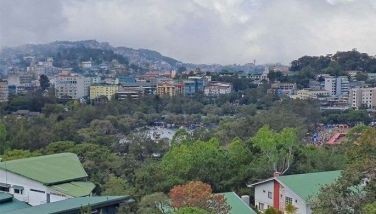Arroyo not forcing Cha-cha even if she favors some changes

November 12, 2003 | 12:00am
President Arroyo reassured the public she has no intention to insist on Charter change (Cha-cha) even as she admitted favoring a number of amendments to the 1987 Constitution, including a shift to a parliamentary or federal form of government.
In a live interview at Malacañang on Monday night, the President told ANC’s "Talk Back" television program that she merely opened the debate on Cha-cha but would continue to stay neutral on the proposed amendments to the Constitution.
Mrs. Arroyo gave these reassurances in response to a phoned-in comment from Davao City that she might lose in next year’s presidential elections if she insists on Cha-cha.
"I’m not insisting it because if I did, I would have done it long before," Mrs. Arroyo said.
"But I opened the debate because I really see that our system... if we remain this way that it takes to institute reforms, we would be left behind again by our neighboring countries. So I want the debate about this," she pointed out.
The President said her own idea of amendment is to change the existing presidential system of government to parliamentary and federal form.
In an exclusive interview by Finance Asia editor Jackie Horn on Monday, Mrs. Arroyo said she is against any amendment to extend the term of the president from the present six years without re-election.
"I believe they (presidents) should be there (presidency) for six years. I’ve not been there for six years. I’ve been there for only two-and-a-half years. We already tried the two terms. I think the six year-year term without re-election was very good. It’s just that I only had two-and-a-half years," the President explained.
Mrs. Arroyo, as the country’s duly-elected Vice President, took over the reins of government when former President Joseph Estrada was deposed in a popular uprising in January 2001.
Mrs. Arroyo believed that if the Constitution would be allowed to "federalize" the passage of laws, it would result in more reform legislation.
"If you have to build an important road, underpass, overpass in Davao City, for it to be decided on in Manila, it’s really quite time consuming and tedious. So we really need those two reforms to federalize the government and also to make it parliamentary," she explained.
The President noted with satisfaction that the ongoing debate on the fundamental changes in Congress has been "more cerebral."
She said earlier that the "gridlock" between the executive and legislative branches of government that stall the country’s advancement can be resolved by shifting to a parliamentary system.
In a live interview at Malacañang on Monday night, the President told ANC’s "Talk Back" television program that she merely opened the debate on Cha-cha but would continue to stay neutral on the proposed amendments to the Constitution.
Mrs. Arroyo gave these reassurances in response to a phoned-in comment from Davao City that she might lose in next year’s presidential elections if she insists on Cha-cha.
"I’m not insisting it because if I did, I would have done it long before," Mrs. Arroyo said.
"But I opened the debate because I really see that our system... if we remain this way that it takes to institute reforms, we would be left behind again by our neighboring countries. So I want the debate about this," she pointed out.
The President said her own idea of amendment is to change the existing presidential system of government to parliamentary and federal form.
In an exclusive interview by Finance Asia editor Jackie Horn on Monday, Mrs. Arroyo said she is against any amendment to extend the term of the president from the present six years without re-election.
"I believe they (presidents) should be there (presidency) for six years. I’ve not been there for six years. I’ve been there for only two-and-a-half years. We already tried the two terms. I think the six year-year term without re-election was very good. It’s just that I only had two-and-a-half years," the President explained.
Mrs. Arroyo, as the country’s duly-elected Vice President, took over the reins of government when former President Joseph Estrada was deposed in a popular uprising in January 2001.
Mrs. Arroyo believed that if the Constitution would be allowed to "federalize" the passage of laws, it would result in more reform legislation.
"If you have to build an important road, underpass, overpass in Davao City, for it to be decided on in Manila, it’s really quite time consuming and tedious. So we really need those two reforms to federalize the government and also to make it parliamentary," she explained.
The President noted with satisfaction that the ongoing debate on the fundamental changes in Congress has been "more cerebral."
She said earlier that the "gridlock" between the executive and legislative branches of government that stall the country’s advancement can be resolved by shifting to a parliamentary system.
BrandSpace Articles
<
>
- Latest
- Trending
Trending
Latest
Trending
Latest
Recommended





























